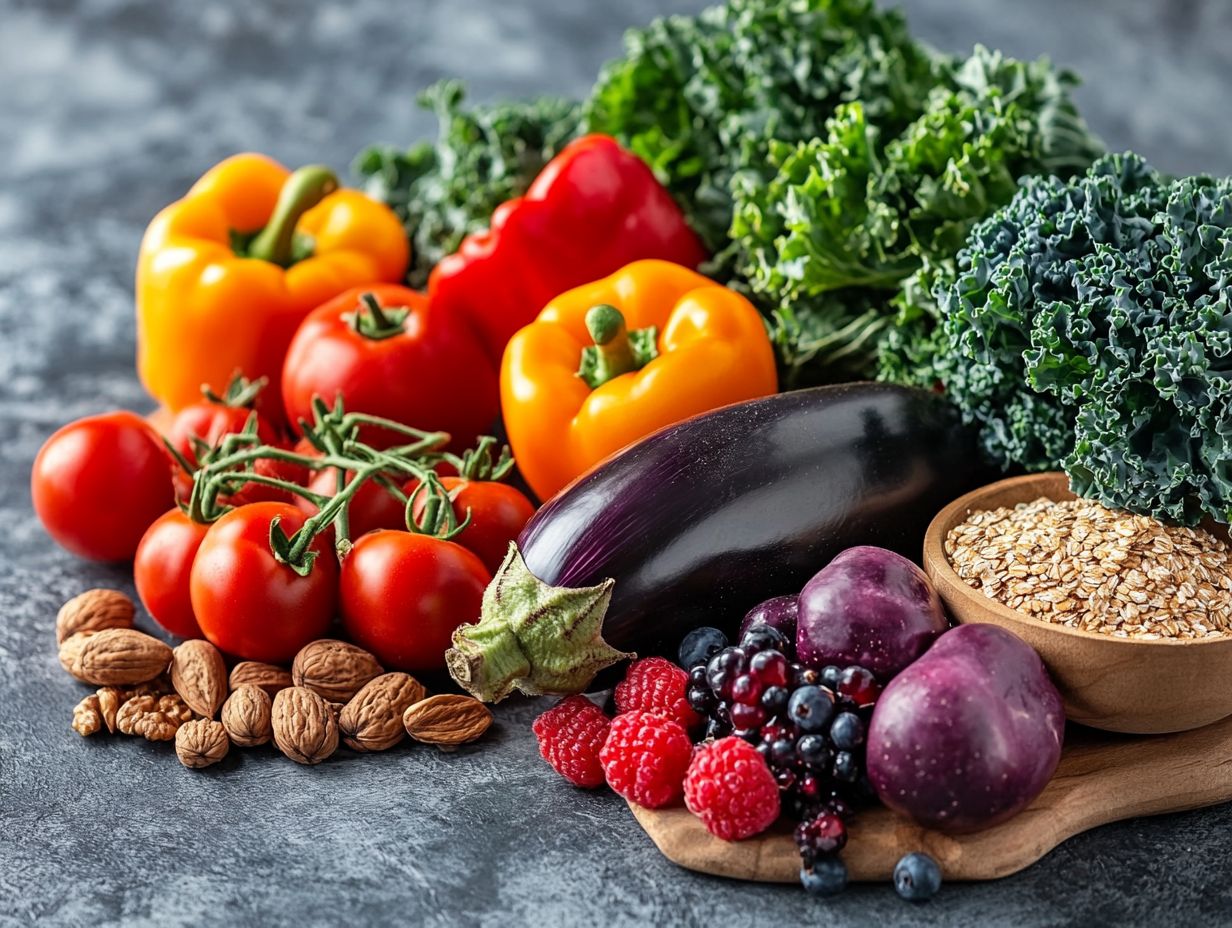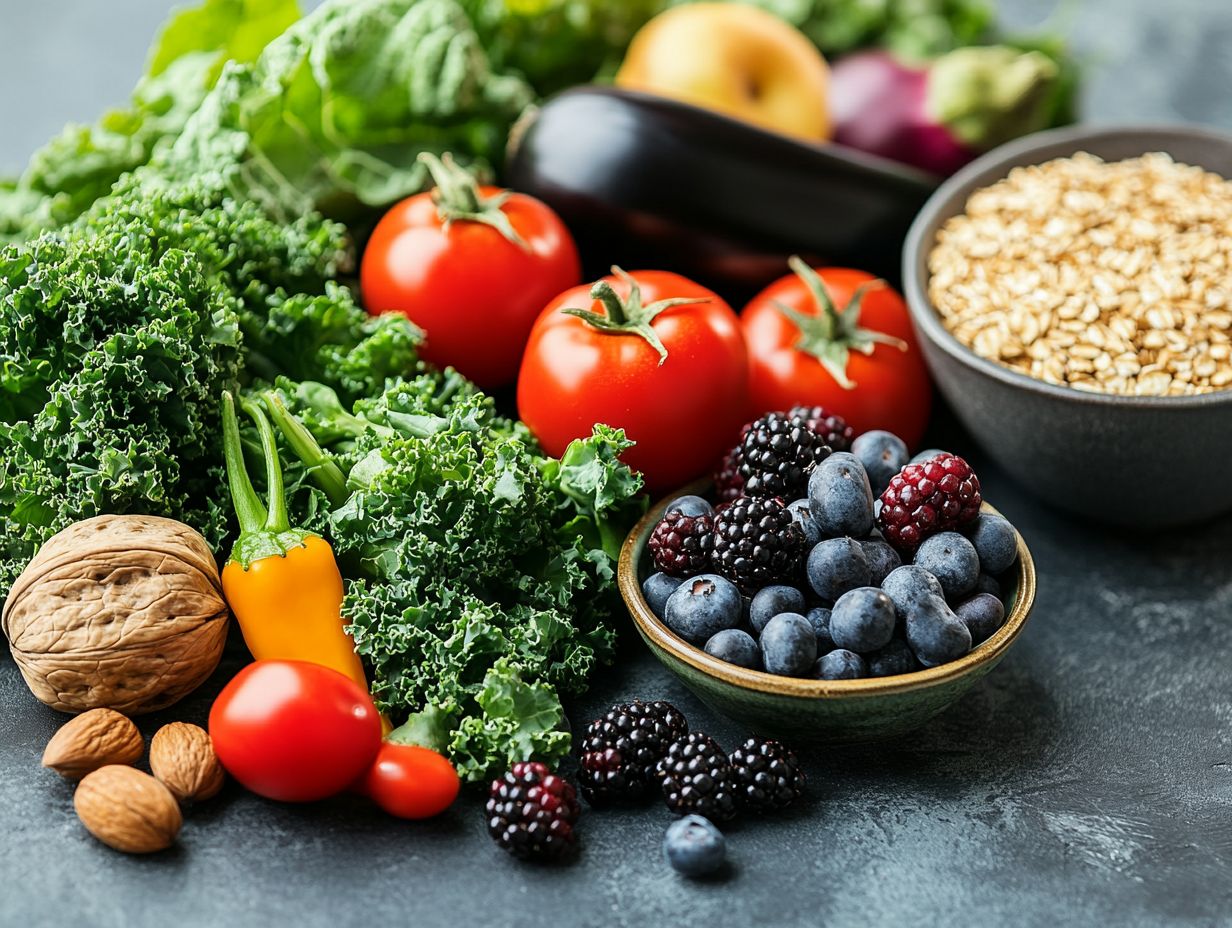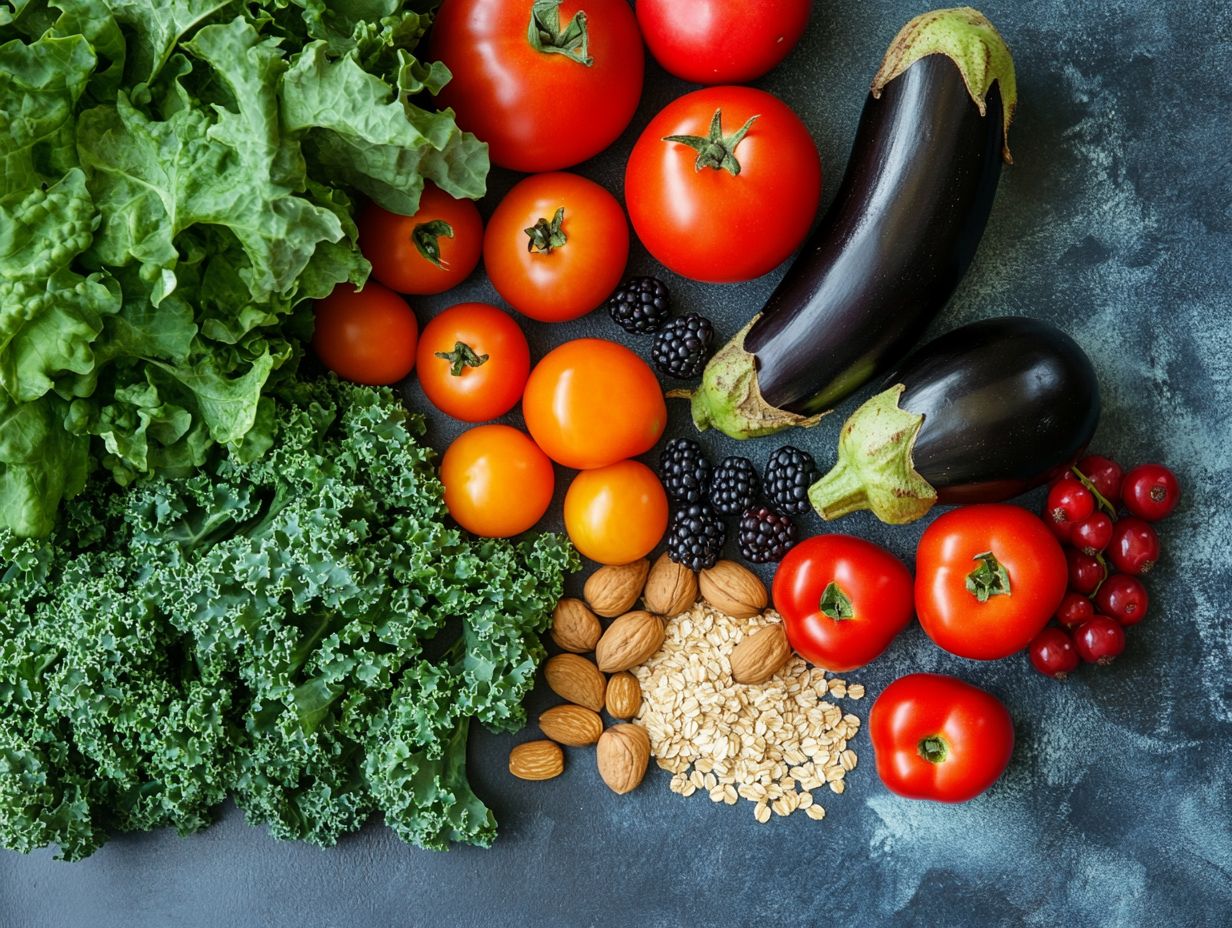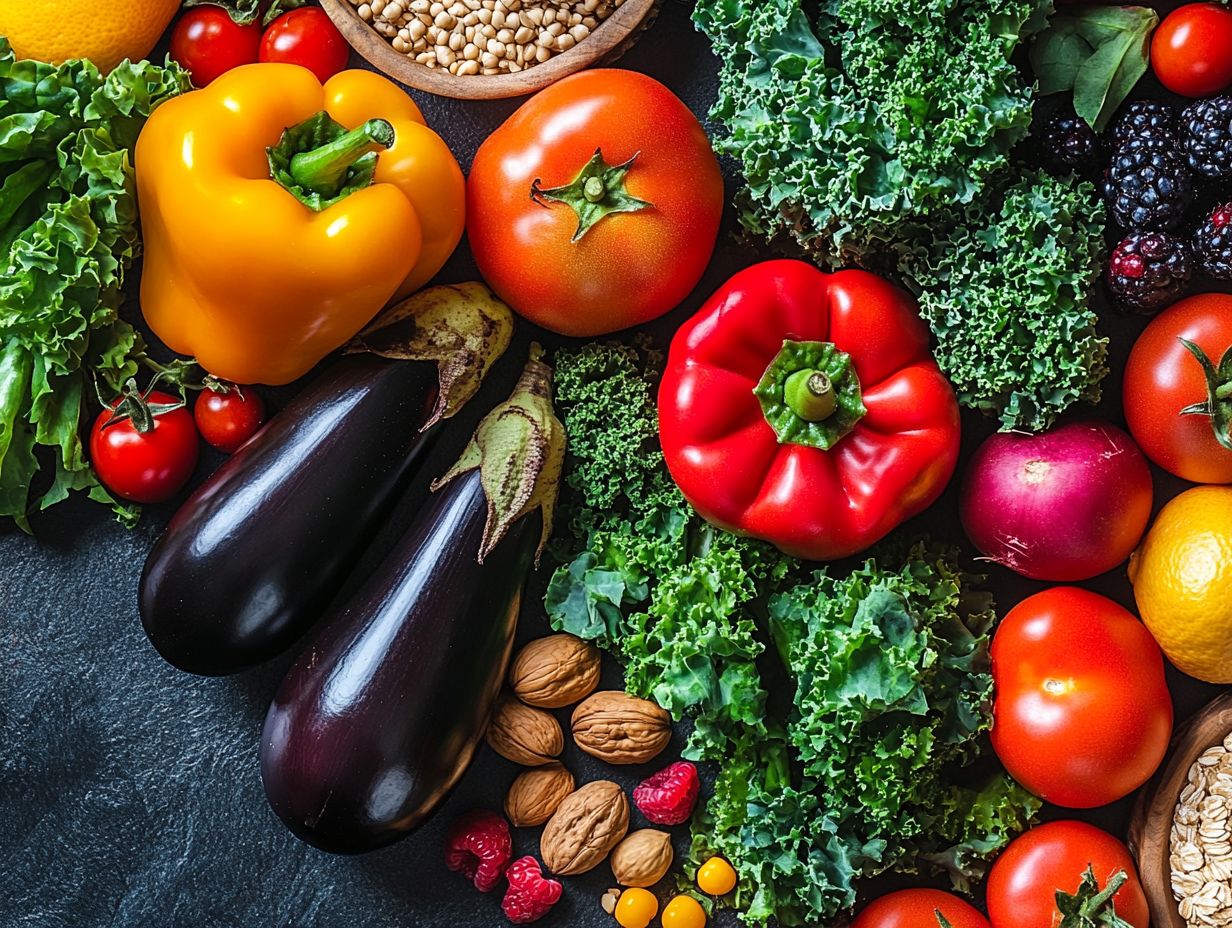The Importance of Variety in Your Diet
A varied diet is vital for maintaining your overall health and well-being. It transcends simple taste preferences; incorporating a diverse range of foods ensures that your body receives the essential nutrients it requires.
This article explores the definition and significance of dietary variety, highlighting its numerous benefits, such as improved nutrient intake and a reduced risk of chronic diseases. You ll also discover practical ways to elevate your meals and make them more exciting.
We will also examine the potential downsides of a limited diet and offer strategies for achieving a balanced approach. Embracing variety in your meals will transform your culinary experience and support your health journey.
Contents
- Key Takeaways:
- Understanding Dietary Variety
- The Benefits of a Varied Diet
- Ways to Incorporate Variety into Your Diet
- Potential Consequences of a Limited Diet
- Finding a Balance in Your Diet
- Your Questions Answered!
- 1. What does “variety” mean in terms of diet?
- 2. Why is variety important in your diet?
- 3. How does having a variety in your diet benefit your health?
- 4. Can eating the same foods every day be harmful?
- 5. How can I incorporate variety into my daily meals?
- 6. Are there any tips for maintaining variety in a strict diet, such as vegetarian or gluten-free?
Key Takeaways:

A varied diet is important for overall health and well-being, providing a range of essential nutrients and reducing the risk of chronic diseases. By experimenting with new foods and meal planning, you can increase variety in your diet and prevent nutrient deficiencies. Striking a balance between variety and consistency can lead to healthier and more enjoyable eating experiences.
Understanding Dietary Variety
Understanding dietary variety is key to unlocking a healthier you! It encourages you to enjoy a diverse array of foods, especially fruits and vegetables, which are essential for your well-being.
Dietary diversity profoundly impacts getting the right nutrients and preventing chronic diseases. Experts like Lizzie Streit emphasize that embracing a variety of foods not only elevates your meal experience but also significantly enhances your health.
The Benefits of a Varied Diet
A varied diet offers many benefits, enhancing nutrient intake and lowering the risk of chronic diseases, which is essential for effective weight management and diabetes prevention.
By incorporating a diverse selection of foods, you ensure that you meet your nutrient requirements. Regularly consuming antioxidants, which help protect your cells from damage, from fruits and vegetables is crucial in combating conditions like metabolic syndrome, heart disease, and obesity.
Improved Nutrient Intake
One of the most significant advantages of embracing a varied diet is improved nutrient intake. It encourages you to explore healthy foods through various cooking methods and options.
This delightful variety not only enhances the flavor of your meals but also ensures you receive a broad spectrum of essential nutrients think vitamins, minerals, and antioxidants.
For instance, incorporating leafy greens like kale gives you a healthy dose of vitamin K, while vibrant bell peppers provide a boost of vitamin C.
The methods you choose for cooking matter too; steaming vegetables preserves their nutrients far better than boiling.
Consider meal prep strategies like batch cooking whole grains and roasting seasonal vegetables to make those nutrient-rich meals more accessible throughout your week.
By mixing food groups, like pairing legumes with whole grains, you can effortlessly craft delicious dishes that maximize nutrient absorption.
Reduced Risk of Chronic Diseases

A varied diet can dramatically lower your risk of chronic diseases, such as metabolic syndrome, heart disease, type 2 diabetes, and obesity. It provides essential nutrients and the myriad health benefits linked to diverse food groups.
Incorporating a wide range of fruits, vegetables, whole grains, and lean proteins into your meals not only supplies vital vitamins and minerals but also ensures a balanced intake of fiber, antioxidants, and healthy fats.
Research indicates that individuals who consume at least five servings of fruits and vegetables daily enjoy a remarkable 20% reduction in the risk of developing chronic illnesses. Adding legumes and nuts to your diet can further bolster heart health due to their richness in omega-3 fatty acids and inflammation-reducing properties.
Making simple lifestyle changes, like cooking at home and cutting back on processed foods, can significantly enhance your dietary diversity and promote overall wellness.
Start incorporating more variety in your meals today for a healthier tomorrow!
Ways to Incorporate Variety into Your Diet
Incorporating variety into your diet is within your reach through attentive meal planning, savvy grocery shopping tips, and the exploration of diverse cooking options.
This approach makes healthy eating enjoyable and fulfilling. By venturing into farmers markets, you can enrich your cooking options and elevate your intake of seasonal, locally-sourced produce.
Experimenting with Different Foods
Experimenting with different foods is an exciting way to expand your palate and discover new flavors. You can explore the various good things in food called nutrients that help keep our bodies healthy.
Incorporating vibrant fruits and vegetables think beets, kale, bell peppers, and purple sweet potatoes not only improves the visual appeal of your meals but also significantly increases your intake of antioxidants.
Trying new grains like quinoa or farro introduces unique textures to your dishes while providing essential proteins and fiber.
Mix roasted vegetables with hearty grain salads to transform your meals into a culinary adventure. These little adjustments can nourish both your body and spirit.
Meal Planning and Grocery Shopping Tips
Effective meal planning and grocery shopping tips are essential for incorporating a variety of healthy foods into your diet. Be sure to consider seasonality and your personal food preferences.
By prioritizing fresh, seasonal produce, you not only support local farmers but also enhance nutrient absorption from your meals. To streamline the process, craft a detailed shopping list showcasing a vibrant array of colors. This ensures you include diverse food items from various food groups.
Rotating your ingredients weekly invites you to explore new recipes, sparking creativity in your kitchen. This keeps your meals exciting and enriches the diversity of nutrients in your diet.
Potential Consequences of a Limited Diet

A limited diet can cause many nutrient deficiencies and health concerns, increasing your risk of serious health problems over time.
This highlights the critical importance of maintaining dietary diversity for long-term health and well-being.
Nutrient Deficiencies and Health Risks
Nutrient deficiencies often stem from a limited diet, leading to serious health problems that can cause obesity issues that have become pressing public health concerns.
When you restrict your food choices, you might unintentionally miss out on essential vitamins and minerals vital for maintaining your health. For example, a diet low in fruits and vegetables can lead to vitamin C deficiencies, risking weakened immunity and dull skin.
Not varying your protein sources can also result in insufficient iron intake, leaving you feeling fatigued and possibly facing anemia. By incorporating a wide range of foods think whole grains, legumes, and healthy fats you can significantly boost your chances of receiving the nutrients necessary for optimal bodily function.
Embracing dietary diversity is key to preventing deficiencies and supporting your overall well-being.
Finding a Balance in Your Diet
Striking a balance in your diet is vital for your overall health. This requires intentional dietary habits and strategies that promote variety.
You can achieve this by incorporating nutritious foods from all food groups, ensuring your meals are both diverse and beneficial.
Start exploring new foods today for a healthier, happier you!
Strategies for Maintaining Variety
To maintain variety in your diet, consider utilizing diverse cooking methods and engaging in meal prep. Exploring various cuisines can elevate your healthy eating experience and help you achieve a well-rounded diet.
Incorporating techniques like grilling, steaming, and stir-frying introduces new textures and flavors to your meals while preserving important nutrients. Preparing meals in advance, such as batch cooking or pre-portioning snacks, makes it convenient to grab healthy options on busy days, helping you resist the temptation of less nutritious choices.
Venturing into global cuisines broadens your palate and offers unique nutritional advantages think Mediterranean dishes rich in healthy fats or Asian recipes loaded with vibrant vegetables. Embarking on this culinary adventure transforms mealtime into an exciting experience that fosters healthy habits!
Your Questions Answered!

1. What does “variety” mean in terms of diet?
Variety in your diet means consuming a wide range of different foods from different food groups, including fruits, vegetables, whole grains, lean proteins, and healthy fats.
2. Why is variety important in your diet?
Eating a variety of foods ensures that your body receives all the important nutrients, vitamins, and minerals it needs to function properly. It also helps prevent boredom and promotes a more balanced and enjoyable eating experience.
3. How does having a variety in your diet benefit your health?
Having a varied diet can improve your overall health and reduce the risk of chronic diseases such as diabetes, heart disease, and certain types of cancer. Consuming a variety of foods also supports a healthy immune system, digestion, and energy levels.
4. Can eating the same foods every day be harmful?
While there are some staple foods that can be eaten every day, constantly consuming the same foods can lead to nutrient deficiencies and potentially harmful levels of certain substances. It is important to vary your diet to ensure a balanced and healthy intake of nutrients.
5. How can I incorporate variety into my daily meals?
Incorporating variety in your diet can be as simple as trying a new fruit or vegetable each week, swapping out one protein source for another, or experimenting with different herbs and spices. You can also vary your meals by trying recipes from different cultures or cuisines.
6. Are there any tips for maintaining variety in a strict diet, such as vegetarian or gluten-free?
While following a strict diet, it may be more challenging to incorporate variety, but it is still possible. Aim to include a variety of plant-based proteins, grains, and vegetables in your meals. You can also experiment with different cooking methods and incorporate new ingredients regularly to keep your meals interesting.
Start exploring diverse foods today for a healthier, happier you!






